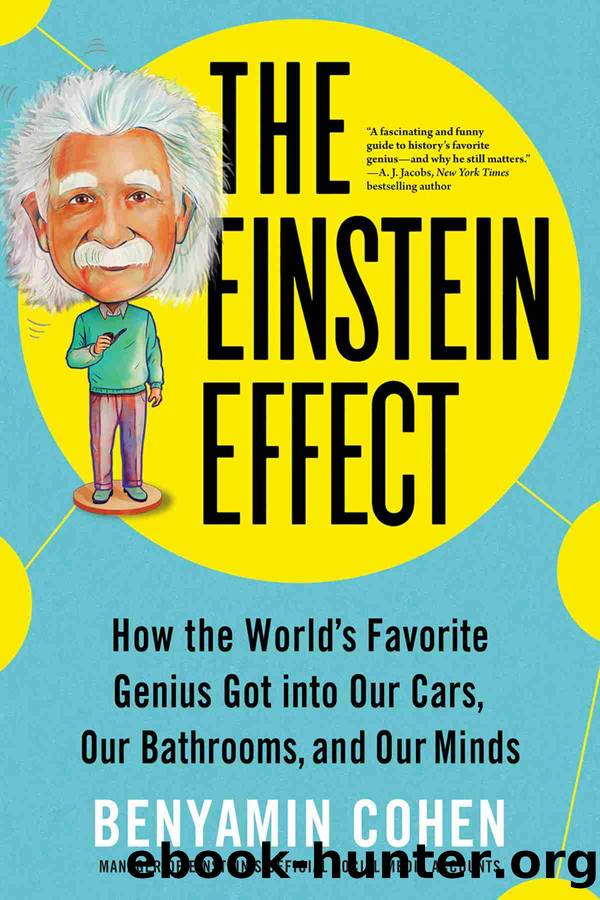The Einstein Effect by Cohen Benyamin;

Author:Cohen, Benyamin;
Language: eng
Format: epub
Publisher: Sourcebooks, Incorporated
Einstein came up with many of his best ideas by devising thought experiments and would often daydream to help figure out complicated concepts. He believed that you could stimulate new ideas by allowing your imagination to wander, without worry about existing constrictions. When you set out to solve a problem you are, in effect, within the confines of that question. But Einstein gave himself permission to just let his mind wander. He often played classical music on his violin as a brainstorming technique. There is science to back up this method. Researchers at the University of California in Santa Barbara studied a group of physicists, artists, and writers and asked them the following: When that âahaâ moment came, what were you doing? Turns out that many of them had their big discovery when they were focused on something mundane.
Itâs one of the reasons Einstein loved to go sailing. He found peace and serenity aboard boats, away from the adoring crowds. âA cruise in the sea is an excellent opportunity for maximum calm and reflection on ideas from a different perspective,â the physicist wrote while floating near the shores of Panama. His wife, Elsa, added: âThere is no other place where my husband is so relaxed, sweet, serene, and detached from routine distractions, the ship carries him far away.â And so, Iâve decided to write this chapter while on a boat in the middle of a lake in my town. Surrounded by nature and the occasional jet-skier, and with poor cell service and no internet to distract me, Iâm beginning to see what Einstein was talking about.
By all accounts, Iâm a better sailor than Albert Einstein. Which isnât saying much. Sailing was one of Einsteinâs favorite pastimes, yet the irony was he wasnât really that good at it. âAccording to his biographers,â wrote Philip R. Devlin, âhe would lose his direction, his mast would often fall down, and he frequently ran aground and had near-collisions with other vessels.â Whatâs more, Einstein rarely wore a life vest and could not even swim. This meant he was constantly having to be rescuedâsometimes by kids and other times by nearby boaters. Thereâs a classic headline from the New York Times that reads: âRelative Tide and Sand Bars Trap Einstein.â Another headline read: âAt relativity, a genius; as a sailor, not so much.â
But for Einstein, who called sailing âthe sport that demands the least energy,â it was an escape. âHe used to sail as a way to think. He loved the serenity of it,â said Jim Lynch, whose novel Before the Wind opens with this line: âEinstein wasnât a great sailor, probably not even a mediocre one.â As Walter Isaacson noted in his biography of Einstein, âHe usually went out on his own, aimlessly and often carelessly. âFrequently he would go all day long, just drifting around,â remembered a member of the local yacht club who went to retrieve him on more than one occasion. âHe apparently was just out there meditating.ââ
Lynch told me that there are lots of stories of Einstein being towed back in.
Download
This site does not store any files on its server. We only index and link to content provided by other sites. Please contact the content providers to delete copyright contents if any and email us, we'll remove relevant links or contents immediately.
| American National Standards Institute (ANSI) Publications | Architecture |
| History | Measurements |
| Patents & Inventions | Research |
Whiskies Galore by Ian Buxton(40747)
Introduction to Aircraft Design (Cambridge Aerospace Series) by John P. Fielding(32384)
Small Unmanned Fixed-wing Aircraft Design by Andrew J. Keane Andras Sobester James P. Scanlan & András Sóbester & James P. Scanlan(32162)
Craft Beer for the Homebrewer by Michael Agnew(17481)
Turbulence by E. J. Noyes(7098)
The Complete Stick Figure Physics Tutorials by Allen Sarah(6667)
Kaplan MCAT General Chemistry Review by Kaplan(6095)
The Thirst by Nesbo Jo(5827)
Bad Blood by John Carreyrou(5807)
Learning SQL by Alan Beaulieu(5459)
Weapons of Math Destruction by Cathy O'Neil(5087)
Man-made Catastrophes and Risk Information Concealment by Dmitry Chernov & Didier Sornette(4793)
iGen by Jean M. Twenge(4722)
Digital Minimalism by Cal Newport;(4628)
Life 3.0: Being Human in the Age of Artificial Intelligence by Tegmark Max(4549)
Audition by Ryu Murakami(4134)
Electronic Devices & Circuits by Jacob Millman & Christos C. Halkias(4074)
1,001 ASVAB Practice Questions For Dummies by Powers Rod(4068)
Pale Blue Dot by Carl Sagan(4046)
